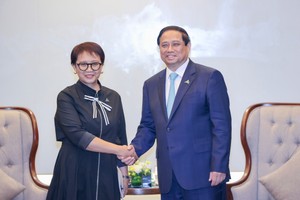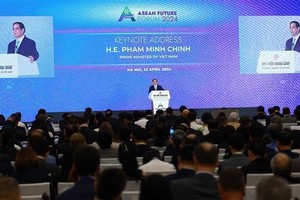SEOUL (AFP) – North Korea has lowered its military alert status, prompting similar moves by Seoul and US forces as tensions on the Korean peninsula showed signs of easing, a report said Friday.
The apparent moves came as South Korea held its latest war games to simulate an infiltration by North Korean troops across the disputed Yellow Sea border, officials said.
Tensions have been high since the North shelled South Korea's frontline Yeonpyeong island on November 23.
Yonhap news agency quoted unidentified South Korean government sources as saying that the North recently lifted a special alert it issued on November 21 for its military forces on the coast near the tense sea border.
"The North Korean military recently withdrew an order for special military readiness it had issued in connection with our Hoguk military drills (in November)," a source was quoted as saying.
The South Korean military and US forces in South Korea had consequently reduced their own alert status by one notch to a normal level, the source said.
A defence ministry spokesman declined to comment on the report.
But he told AFP the computerised military exercise involving the South Korean navy and marines "began as planned", declining to give details.
Navy officials said Friday's manoeuvres were designed to enhance the South's capability to repel a surprise landing on islands.
Command posts were involved in the simulated war games but it was unclear whether troops were involved in any physical manoeuvres.
Besides the shelling in November, the North also raised security fears that month by disclosing a uranium enrichment plant to visiting US experts.
But after a difficult year on the Korean peninsula, 2011 started on a more peaceful note.
The North began the year calling for improved relations with Seoul, while South Korean President Lee Myung-Bak Monday also reached out, saying he was open to talks and offering closer economic ties.
Efforts to resume long-stalled nuclear disarmament talks with the North also gained momentum as Beijing urged dialogue and Pyongyang signalled it was willing to return to the negotiating table.
In an unusually cordial statement, carried by its KCNA agency, North Korea said Wednesday the communist nation "courteously proposes having wide-ranging dialogue and negotiations".
But South Korean officials were dismissive of the comments.
Vice Unification Minister Um Jong-Sik said on KBS radio that the North should show seriousness of purpose by acting on its obligations under a 2005 agreement on denuclearisation and apologising for the November shelling and the sinking of a South Korean warship last year.
Amid the more positive tone, Japan's foreign minister called for renewed dialogue on the divided Korean peninsula in Washington on Thursday, but said the North should first take "concrete actions" to lower tensions.

"The nuclear and missile development issue of DPRK (North Korea) is a cause for major concern," Seiji Maehara said in a speech to a Washington think tank before meeting with US Secretary of State Hillary Clinton.
"What is most important is that a North Korea-South Korea dialogue be opened up," Maehara said at the Center for Strategic and International Studies.
























